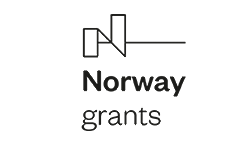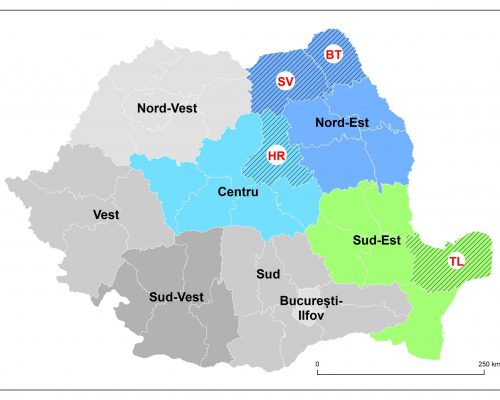The target group of the project will contribute to the fulfillment of the project call indicators as follows::
- 2% of the total value of children with special educational needs (SEN) considered by the call
- 17% of the total value of children at risk of abandonment that is considered by the call
- 8% children who have improved their school participation by at least 10%
- 4% number of teachers trained in working with children and young people at risk of early school leaving
- 7% number of teachers trained / trained in working with children and young people with special educational needs
- 3% number of parents of children or young people at risk of early school leaving who received support
- 24% number of parents of children or young people with special educational needs who received support
Considering the fact that the project will take place in 3 development regions, the North-East Region (Suceava and Botoșani counties), the South-East Region (Tulcea county) and the Center Region (Harghita county), it is worth mentioning some specific aspects related to the need of the implementation in the partner schools.
Thus, according to the development strategies of the three regions, we can see that these are the regions that currently have the highest level of poverty. Also, the North-East Region has the largest share of Romania’s poor population (26% in 2010). This equally has very serious repercussions on the education system and the quality of education in the schools of the most disadvantaged cities and towns in the region.
Although the North-East Region is the largest development region of Romania in terms of population and area, it ranks last in relation to the level of development.
The situation is similar in the South-East Region, where according to the Development Strategy of the region, Tulcea County has the lowest value of GDP per capita compared to the region of which it is part and a high risk of poverty for the resident population.
The same thing happens in Harghita County where, according to the development strategy of the Center Region, the majority of the population has an increased risk of poverty. This state of affairs is reflected negatively especially in the field of education and among children in primary and secondary schools who often due to the difficult situation at home (single-parent families, parents working abroad, large number of children, etc.). presents an extremely high risk of dropping out of school.
Based on these considerations, the project will carry out activities in 6 localities in the North-East Region, one locality in the Center Region and 4 localities in the South-East Region, in schools located in poor and isolated communities, with a declining population due to excessive migration, which has a negative impact on children in partner schools.
Also, the proposed interventions are correlated with the objectives proposed by the Strategy on reducing early school leaving in Romania and the National Strategy for the promotion and protection of children’s rights , respecting the basic principles pursued by them:
- Promoting inclusive education – 830 children who will benefit from inclusive education and activities designed to develop their potential by promoting activities aimed at active learning, protecting the environment and promoting values and principles of equal opportunities.
- Promoting actions to support parents with children at risk of abandonment or children with special educational needs – 268 parents who will benefit from parental education on various topics depending on the real needs identified at the level of the community they belong to and in depending on the specific problems that each parent faces
- Promoting actions aimed at the specialization of teachers in terms of inclusive education and the issue of children with SEN – 211 teachers who will participate in a specialization course aimed at inclusive education, reducing school dropout and the issue of children with SEN, and 30 teachers and specialists who will benefit from a post-graduate program focused on the needs of children with special educational needs and the promotion of inclusive education.
Given the area of implementation of the project, it supports the directions of action promoted by the Strategy on reducing early school leaving in Romania which provides for the promotion of active desegregation policies and providing additional support to schools in disadvantaged areas.
At the same time, the project responds to the main challenges identified in the strategies mentioned above, regarding the education of children in rural areas. Thus, low incomes, low level of education of parents, long distance from school or lack of support from the family, are the main causes of dropping out of school.
Regarding the integration of children with SEN, the biggest challenge is the lack of specialized teachers and the lack of adaptation of the current curriculum to the needs of children at risk of exclusion. Therefore, the target group of teachers will be selected from schools that have children with SEN, so that they can develop communication and relationship skills with children with SEN to help them integrate into the classroom.


